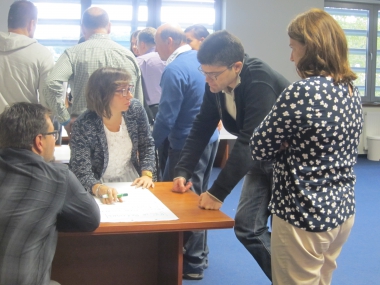Procurement is a Cycle – monitoring is a core and continuous spoke
Edited on
09 October 2017The sixth transnational meeting of the Procure network took place in Koszalin, Poland on Tuesday 12th and Wednesday 13th September 2017. The focus of the meeting was upon how cities can monitor the impact of their procurement spend in local economic, social and environmental terms.

Prior to discussing specific approaches to monitoring, however, we reflected on the topics of our previous transnational meetings. These have been on the topics of: EU and national level procurement law; spend analysis and developing procurement strategy; innovation in procurement (social and environmental criteria); and engaging Small to Medium Sized Enterprises (SMEs). We realised that none of these topics have been looked at as an isolated component of undertaking procurement. Instead all of them are inter-connected.
Indeed, if we are to realise the opportunity that the process of procurement brings for addressing economic, social and environmental challenges across Europe, then we have to increasingly think of procurement as a cycle of activity rather than a singular decision-making process. For me, being progressive in procurement consists of six inter-related stages of activity or principles.
The first is that cities need to understand how their procurement processes are undertaken and where their procurement spend goes – they effectively need a baseline position of where spend goes geographically, in sectoral terms, and by organisation type such as SME. Without this understanding, cities do not know where there is scope to shift and amend process and practice to deliver enhanced impact.
The second is that cities need to understand which issues they want procurement to contribute towards addressing. They effectively need an Outcomes Framework which details outcomes such as: addressing unemployment; improving skills; and supporting the voluntary and community sector. There then needs to be political and strategic support to enable those outcomes to be built into procurement strategy and associated tender exercises.
The third is that cities need to think about when designing goods and services (commissioning) which wider outcomes they can contribute towards. This needs to happen way before the procurement process. So as way of an example, when a new construction project is being devised, those designing it need to think about whether new job opportunities or apprenticeships can be created as part of it. They also need to decide what percentage of the procurement decision will be weighted to those wider outcomes, e.g. 10%.
The fourth is that cities need to embed questions around wider outcomes into tender documents. So they need to be asking potential suppliers ‘how many new jobs they will create’ or ‘what types of support they will provide for the voluntary and community sector’ or ‘whether they have an environmental management strategy’. This encourages suppliers to demonstrate in the tender process how they will contribute to achieving such outcomes.
The fifth is that cities need to score tender responses in relation to the responses to questions around wider outcomes. There are three ways of doing this – quantitative, so on the number of jobs a suppliers states they will create; qualitative, so on the types of support a supplier will provide to the voluntary and community sector; or pass/fail, so on whether they have an environmental management strategy or not.
The sixth is that cities need to embed the outcomes which suppliers propose they will deliver into the terms of the contract. Monitoring of impact should be a consideration in each of the above components of the procurement process – cities should be thinking about how they are going to measure the contribution suppliers make to the wider outcomes detailed in any Outcomes Framework. However, it is only once the contract is underway that monitoring can be undertaken. There are two main ways of monitoring impact. One is through reviewing how levels of spend have increased in a local economy through spend analysis and through undertaking surveys with a sample of suppliers around particular outcomes. The second is to contract manage the delivery of wider outcomes on a monthly, six monthly or annual basis.
Procurement is fast becoming recognised as a way of achieving wider outcomes across Europe. However, examples of effective approaches to monitoring and impact measurement are patchy. Our 11 cities now understand how monitoring is a core component of the procurement cycle and will seek to embed into their action plans and activities moving forward.
Matthew Jackson is the Lead Expert for the Procure network.
Matthew is the Deputy Chief Executive of the Centre for Local Economic Strategies (CLES)
Submitted by sbamber on
